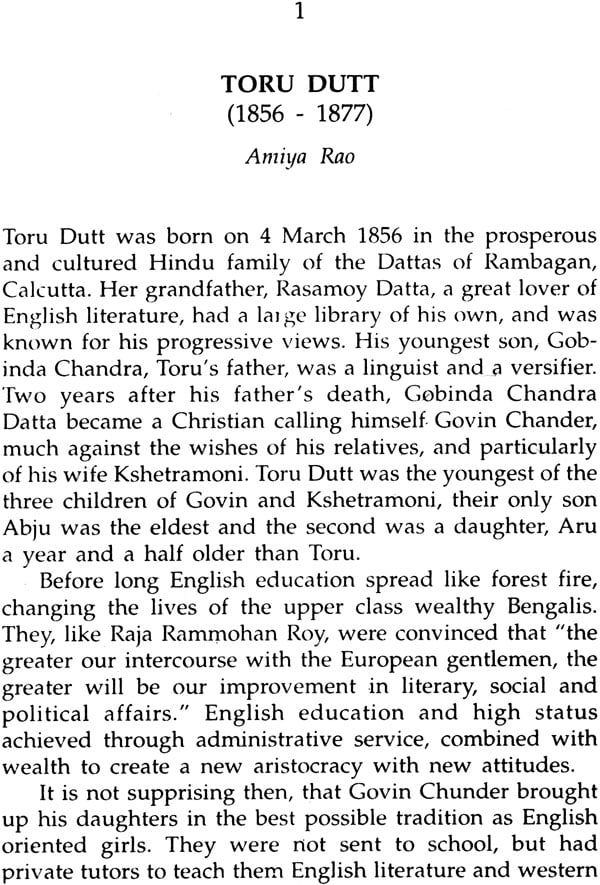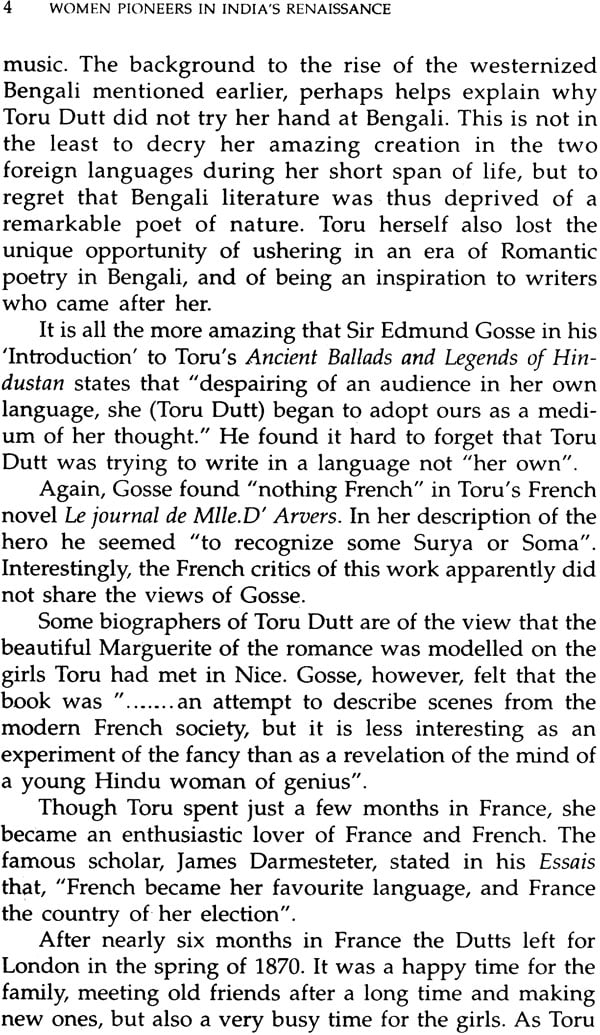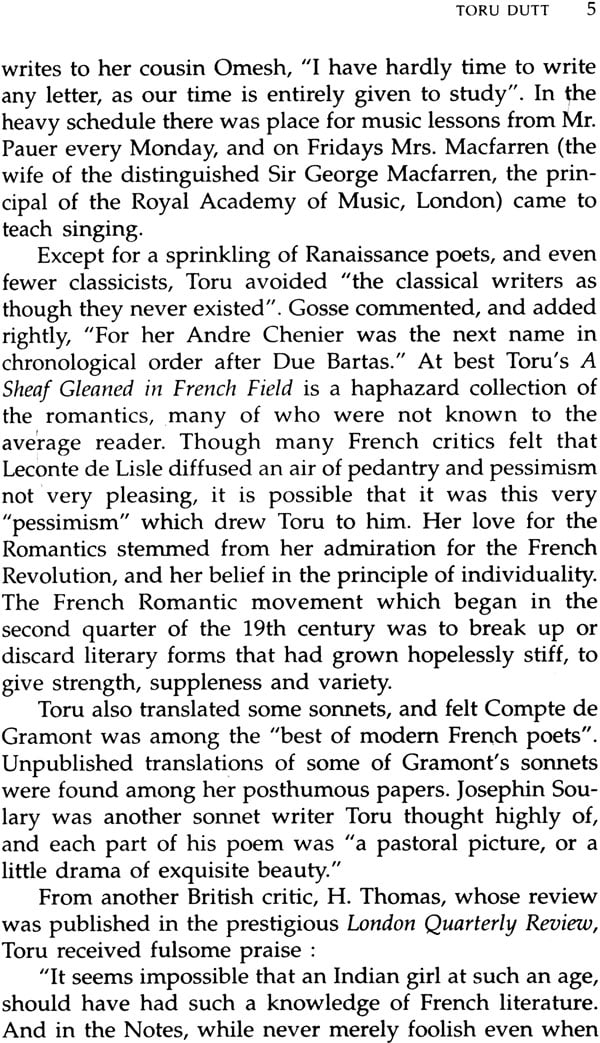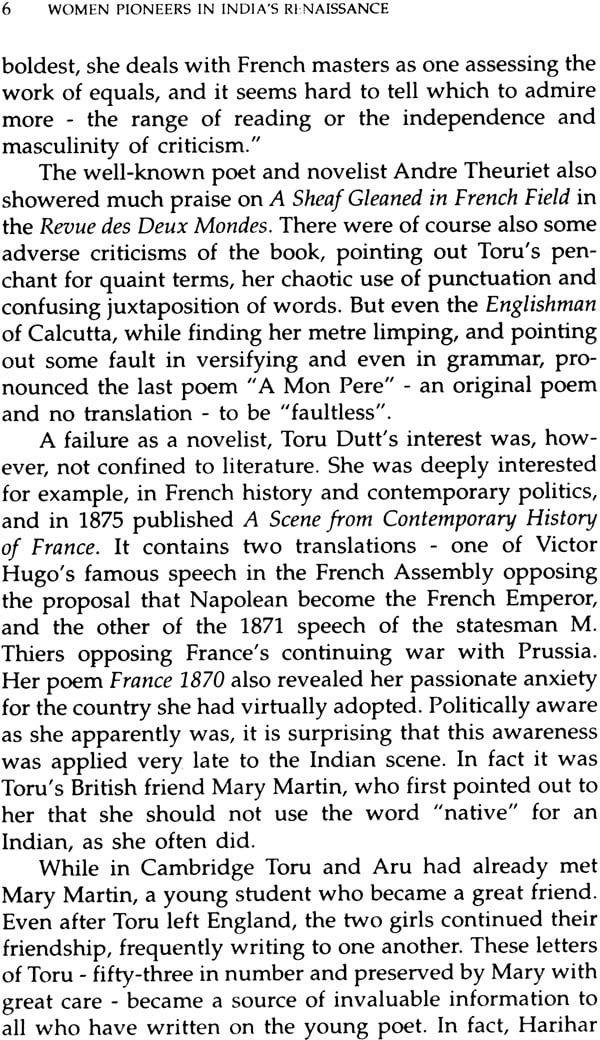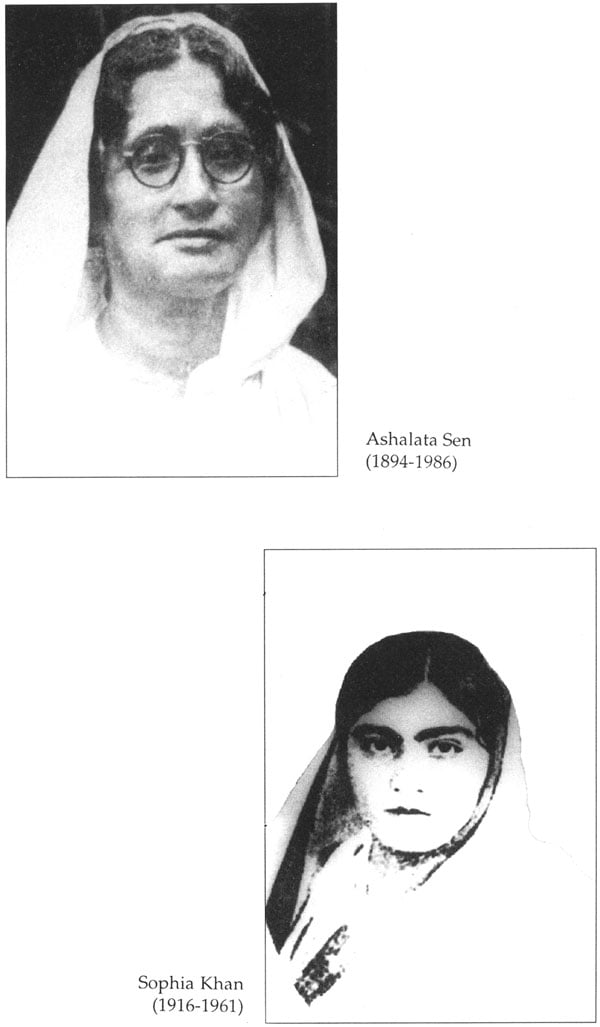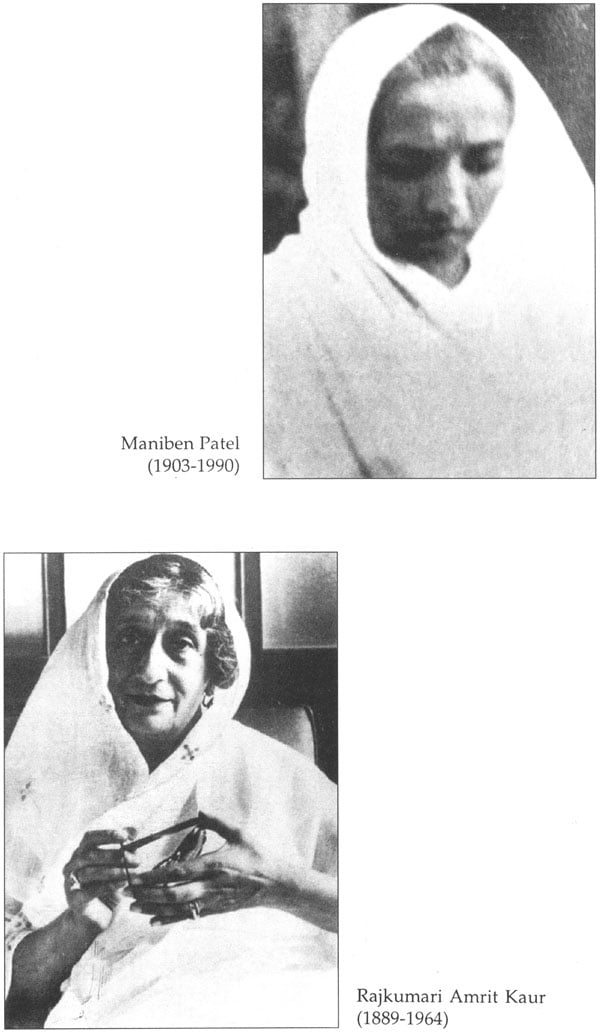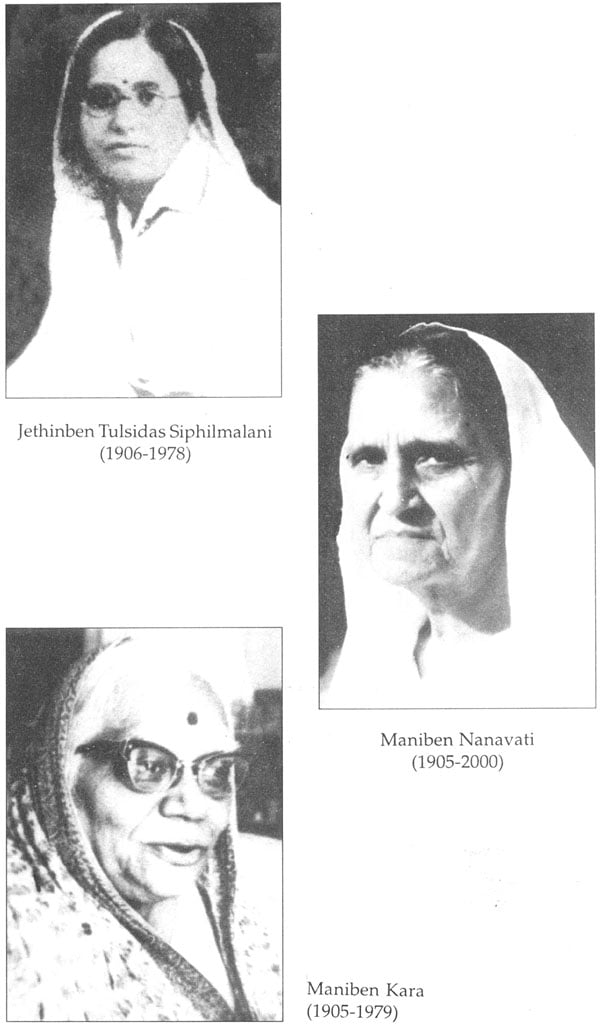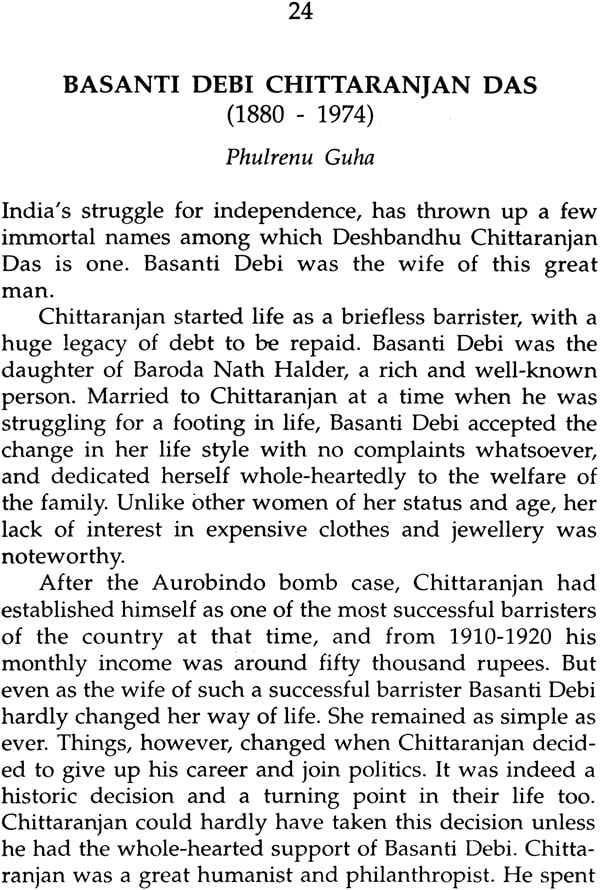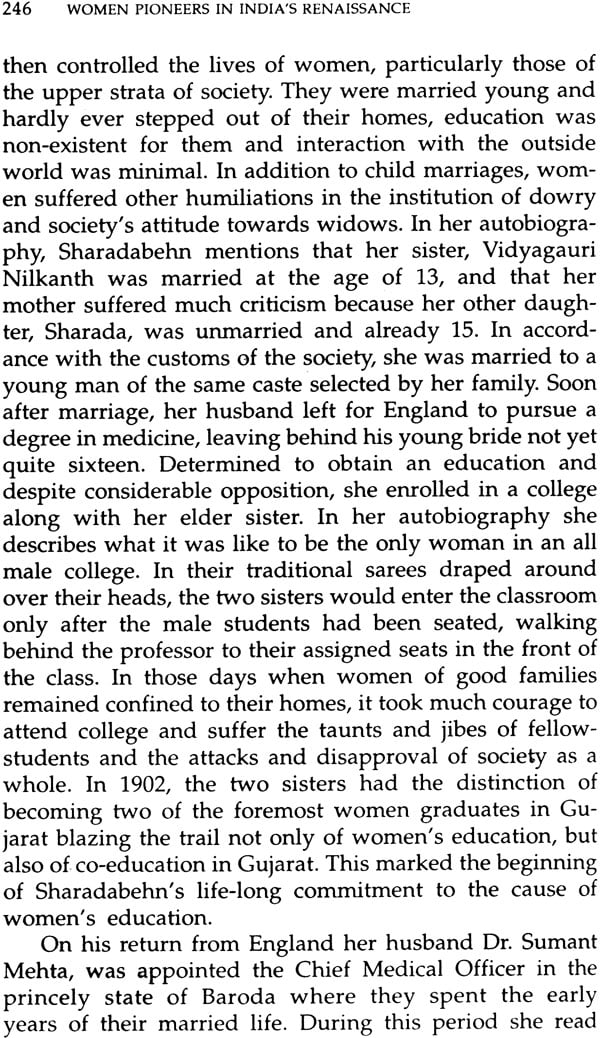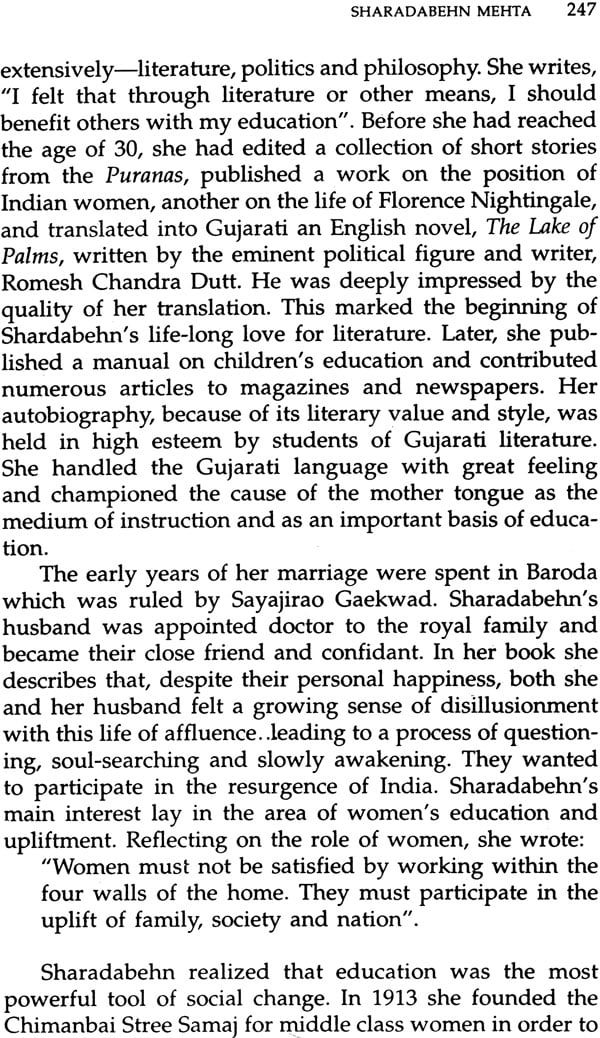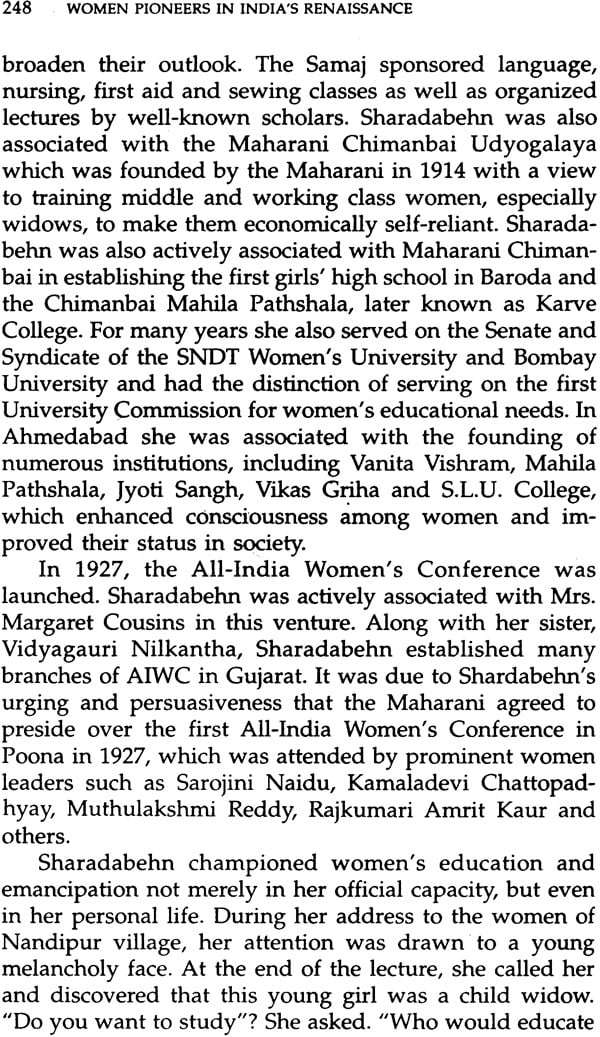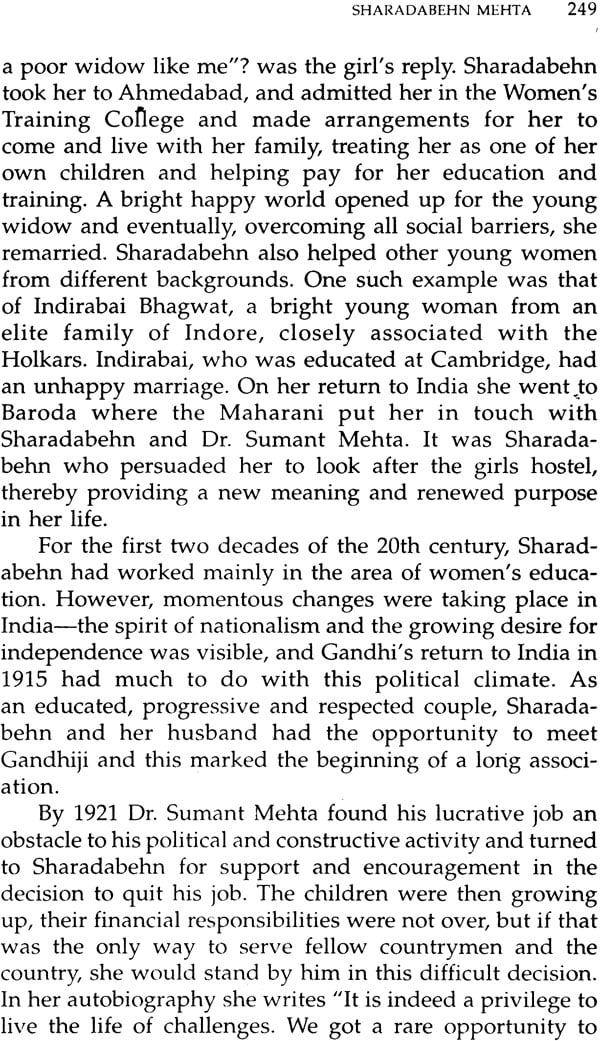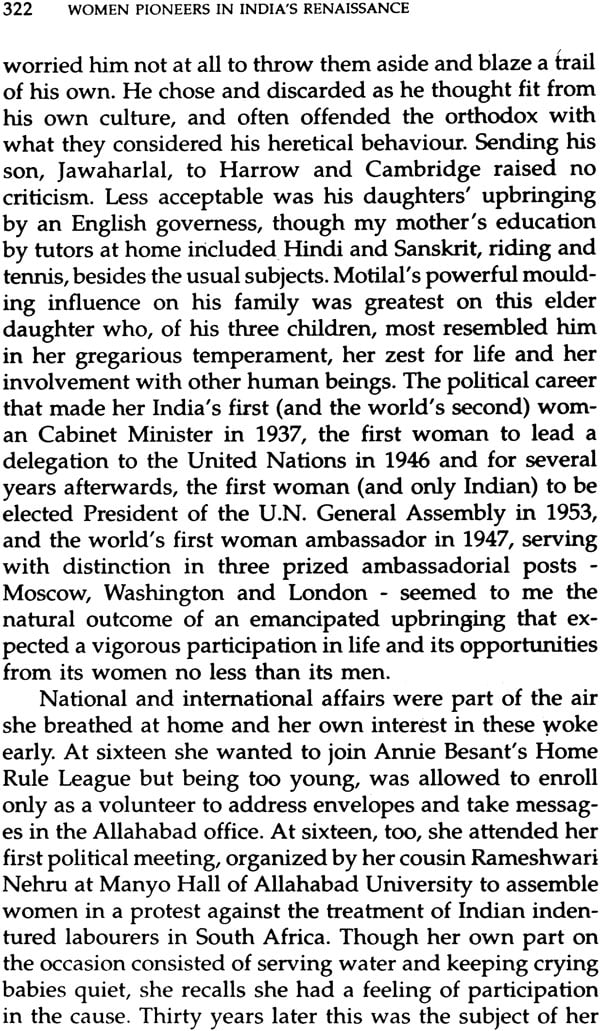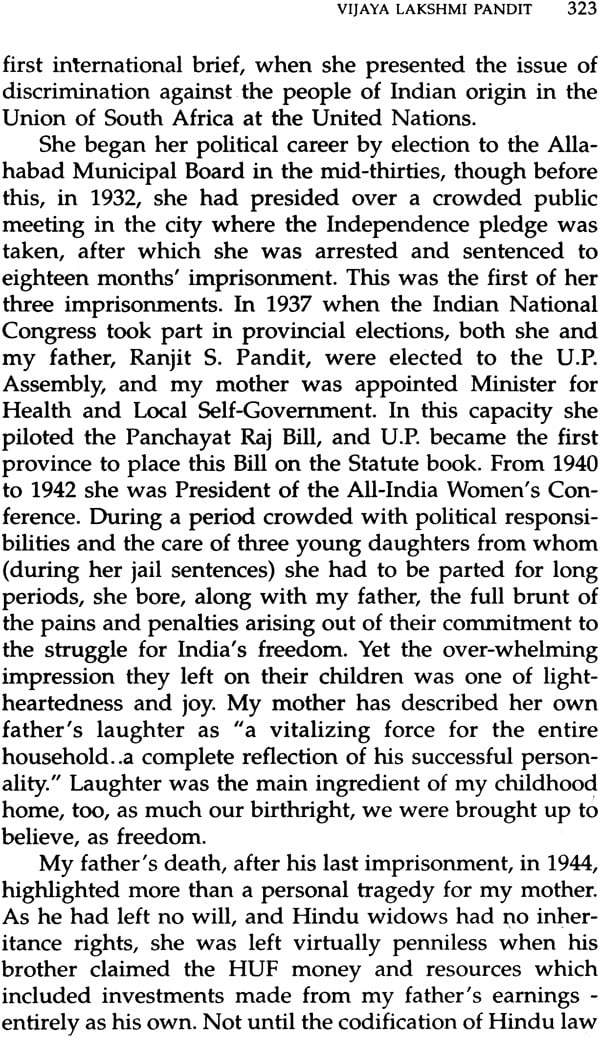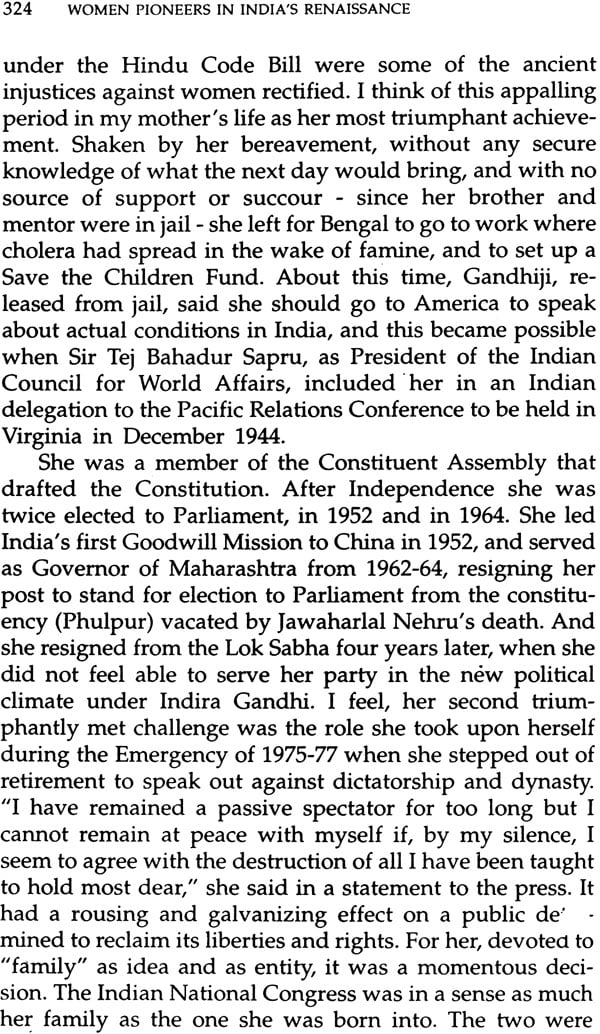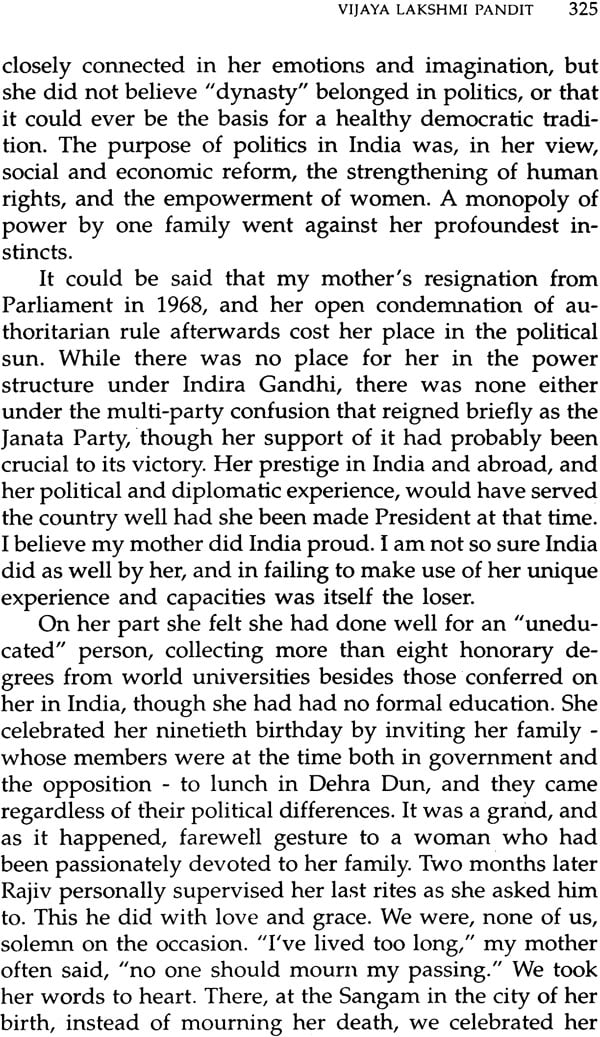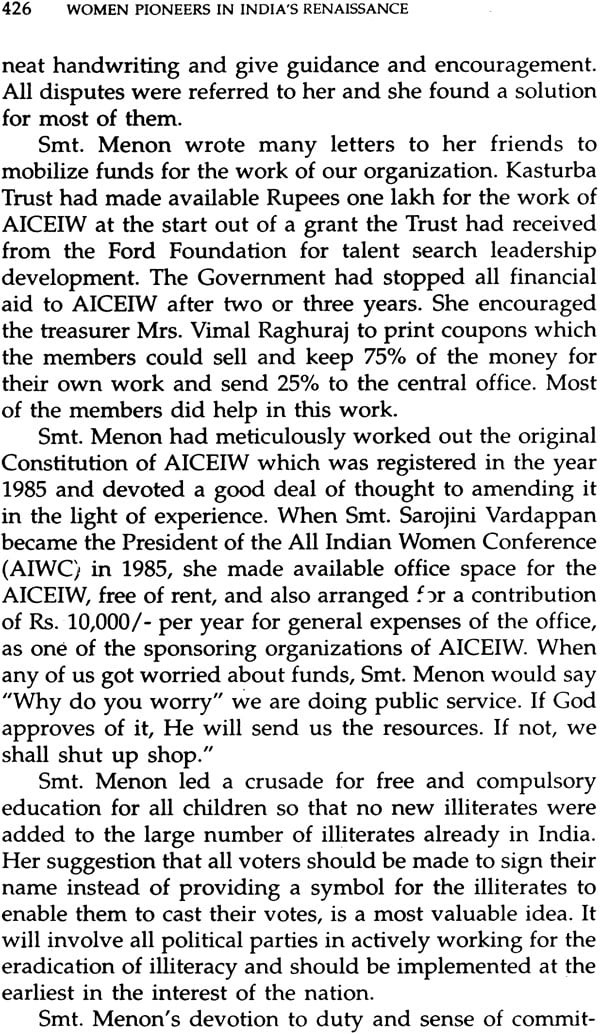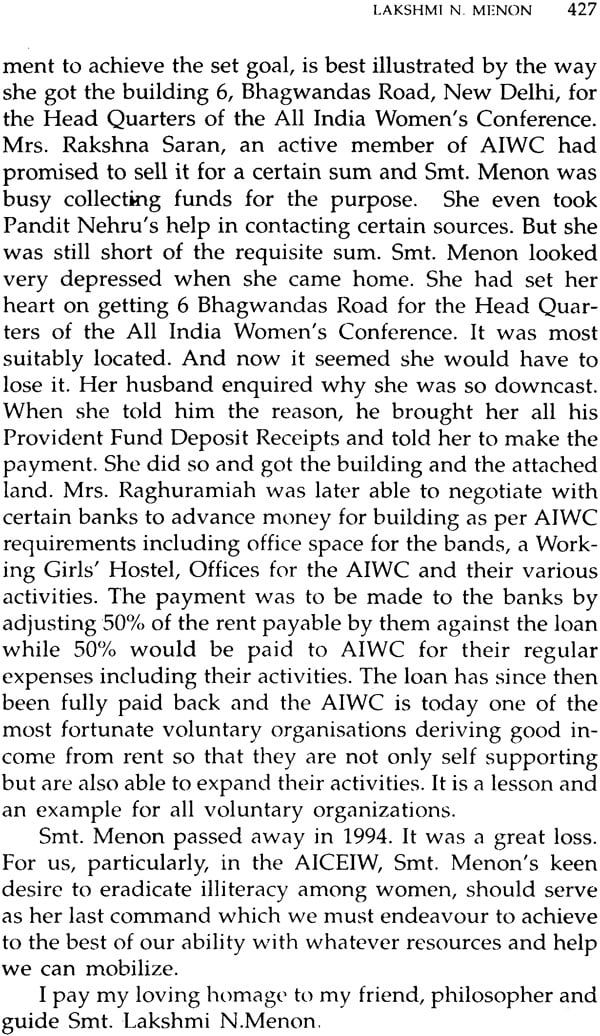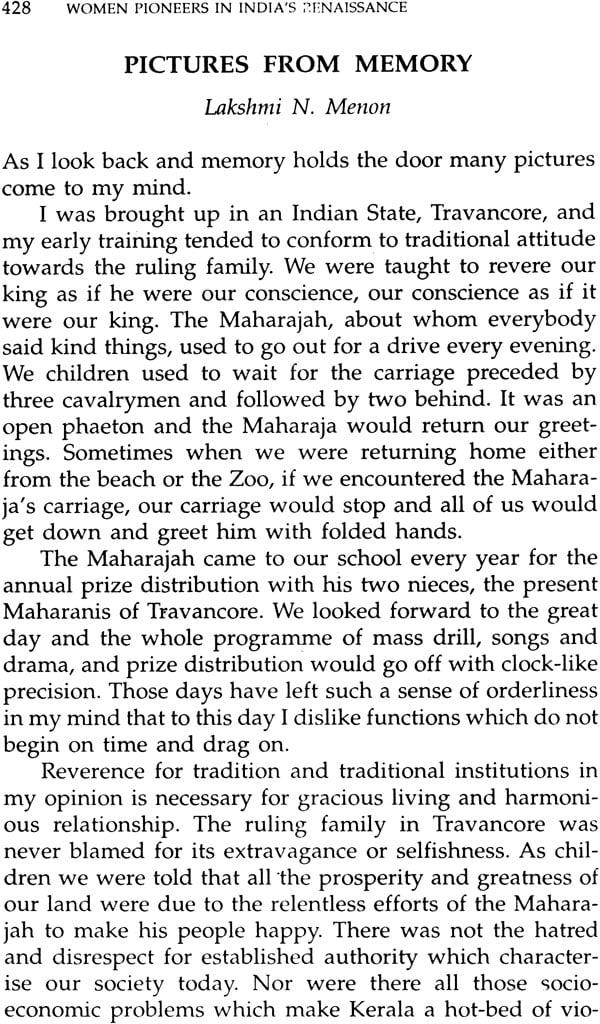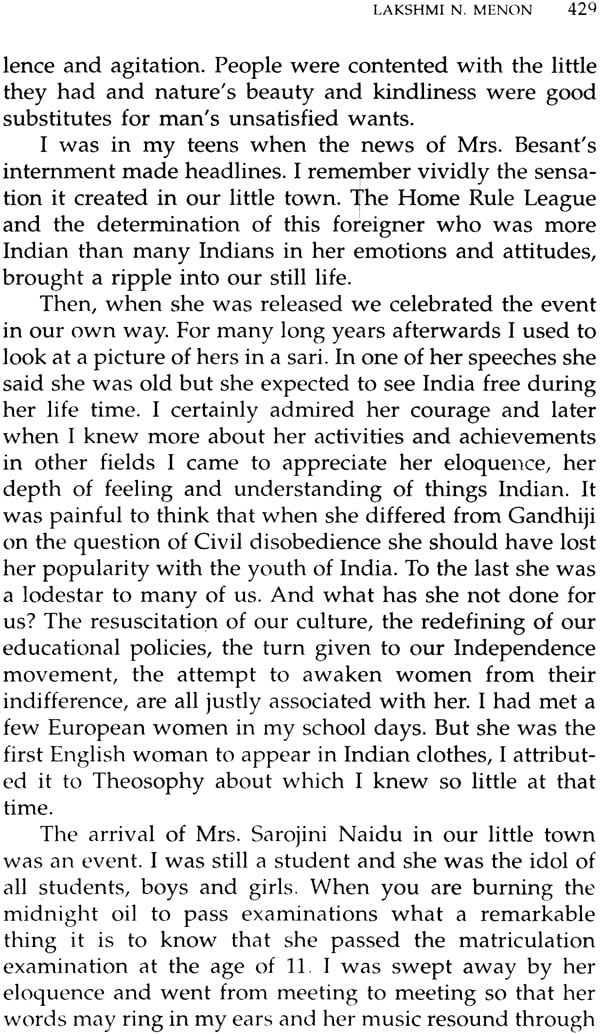
Women Pioneers In India's Renaissance
Book Specification
| Item Code: | IDD677 |
| Author: | Ed. By. Sushila Nayar & Kamla Mankekar |
| Publisher: | National Book Trust, India |
| Language: | English |
| Edition: | 2003 |
| ISBN: | 812373766 1 |
| Pages: | 469 (B & W Illus: 63) |
| Cover: | Paperback |
| Other Details | 8.6" X 5.4" |
| Weight | 640 gm |
Book Description
Indian renaissance which coincided with the rise and growth of Indian nationalism and its culmination in freedom for the country, is singularly marked by the active role of a large number of women. Each of them has in their chosen mission, brought to it all the energy and quality of service and sacrifice which lay within her. They thus not only enriched numerous other lives, but also gave shape to a modern India. This volume brings to us their struggles, aspirations and achievements. Each life sketch and memoir in this volume, bears the imprint of the author's close association with these pioneering women and hence makes it a unique document for the present future.
Dr. Sushila Nayar, (1914-2001) Chairperson, Kasturba Gandhi National Memorial Trust and All India Committee for Eradication Illiteracy among Women, President, Kasturba Health Society, Sevagram and Honorary Director, Mahatma Gandhi Institute of Medical Sciences, Sevagram. Edited vols. IV, V, VI, VII and VIII of the multi-volume Biography of Mahatma Gandhi Completing her brother Pyarelal's great project after his demise in 1982. author Mahatma Gandhi's Last Imprisonment: The Inside Story .
Mrs. Kamla Mankekar, journalist, social worker, author and activist, was chairperson of the Delhi Commission for Women. She was associated with Times of India, The Indian Express, and the Illustrated Weekly of India, she was also vice-president off All India Women's Conference.
This volume owes its origin to the thought that the younger generation of boys and girls should come to know as directly as possible the struggles, aspirations and achievements of women who have given shape to present- day India. The beginning was somewhat accidental. When Mrs. Lakshmi N. Menon wrote about how the life and work of Annie Besant and Sister Nivedita had influenced her in her early years, it made one realize that in all parts of India women of exceptional qualities had given their lives to uplifting women, overcoming social evils, educating girls and women, and securing for them their due role and status in society. There was an extraordinary galaxy of such women. Their labours and trials were a treasure to be cherished for the present and the future. As far as possible, if those who knew them and had some personal associations with them could relate their own remembrances of those about whom they wrote, the record would constitute a unique legacy for the future.
, When Mrs. Lakshmi Menon wrote to eminent women social workers in different parts of the country placing her thought before them and offering some suggestions, the response was immediate and spontaneous. As desired by her, shortly afterwards I joined her. and have continued her work after Mrs. Menon passed away on 30th Novem- ber 1994. In 1999 Mrs. Kamla Mankekar joined me .
. Each life sketch and memoir in the collection that follows speaks of women who pioneered India's renais- sance and left their imprint on society. Each of the women pioneers chose her own mission and brought to it all the energy, vision and quality of service and sacrifice which lay within her and thus enriched numerous other lives.
How much does the present generation know about the remarkable endeavour and struggles that women under- went to bring themselves to where they stand today. And will the coming generations ever get even an inkling of the courage, fortitude, wisdom, faith in their destiny and sacrifices of these pioneers of India's renaissance? It is our rich heritage and it is only appropriate that women of India become aware of it and cherish it.
Indian renaissance which coincided with the rise and growth of Indian nationalism, climaxing in freedom for the country, is singularly marked by the active role of a large number of women along with that of men.The relentless fight against social opression and prejudices and the arduous attempts at the revival of Indian art, literature and other forms of cultural advancement ran parallel and sometimes got entwined with the nationalist movement. The task of women pioneers, thus, was by no means an easy one.
Though Indian women did not have to go through a suffragette movement as in Britain and some other indus- trially advanced countries, the barriers of social prejudice they had to overcome in all activities were formidable. The part played by them constituted in itself an epic saga in the political and social history of this country. Many of them had to encounter stonewalling opposition at every level from the household, community, in area of functioning and the alien administration. This band of pioneers who evolved in the late 19th and early 20th century gave direction and purpose to the mass of the deprived women of the nation.
Today, at the dawn of a new millennium, Indian women find that while much has been achieved by way of constitutional rights and opportunities, they have still a long way to go to secure their due place in the Indian social and political structure. That, the empowerment of women through equal opportunities is a basic requirement for national advancement, is conceded both by policymakers and society, This itself is no mean achievement. While many have taken full advantage of the changed circum- stances, a very large segment of Indian womanhood still suffer deprivation and descriminatory attitudes.
It has to be noted that the problems attendant on the women who participated in and often led the freedom struggle were quite the same for those who tried to scale heights of attainment in other activities. A measure of the tribulations they had to face is provided by the biograph- ical sketches of the-Iiterati and educationists for whom in their early years basic schooling was denied.
All of the women whose life stories fill the following pages have left their imprint on history and an inspiring legacy for subsequent generations to take their programmes further ahead. The close cadence in the Indian renaissance and in the independence movement enhanced the richness of the part played and contributions made by these wom- en. In fact, the 20th Century, which was a continuous period of upheavals that shook time-worn beliefs, pulled down social barriers in the way of progress and aroused the conscience of society to the wrongs perpetrated through centuries, could well be called the century of the Indian women because of the ordeals they have gone through in the relentless struggle waged to secure their due place in society and which is still continuing. If today women are in a position to speak up with conviction and courage it is because of the monumental performance of the pioneers. A common streak in the lives of these pioneers is the demonstration of their commitments and preferences early in their lives. Whatever be their background and cultivated tastes, they were strongly sensitive to any offensive expe- rience as Indians to their national heritage and their pride in it. That explains why Durgabai at age 12 opted for "Public Service" rather than lead a secure life of matrimo- nial bliss.
It also explains why the young writer Toru Dutt for all her westernised outlook could not put up with any slight to her Indian compatriots. Toru died when she was 21 years old. Her works provide a rich insight into the times she lived in. Though she lived in England and France, she could not put up with any slight to her fellow countrymen. When an Indian was sentenced to three weeks' hard labour because he had defended himself against the dogs owned by an Englishman, her sensitivity quickly respond- ed. She wrote: "The judge ought to be dismissed for so monstrous a perversion of law you see how cheap the life of an Indian is in the eyes of an English judge." This was so in the 19 century when Indian nationalism had not become strident. If this was the response of a westernised Indian lady, Sister Nivedita, Irish by birth, was unhesitant- ingly critical of the condescending British attitude towards the scientific discoveries of Jagdish Chandra Bose.
This glorious band of great women of the century who spoke for India and those belonging to their gender men- tioned in this book include quite a number of foreigners. Lakshmi N. Menon pays rich tributes to "the long line of individuals" "who though born in foreign lands had identified themselves with our ideals and aspirations" and "who willingly cast their lot with India and its people".
Among them was sister Nivedita, ardent follower of Swami Vivekananda, who worked for the uplift of Indian women and later joined the Ramakrishna Mission. Mi- rabehn abandoned a life of ease in her affluent British family and slept on floor and lived on frugal vegetarian meals so that she could merge into the austere life style of Gandhiji's ashram. She spent her life serving rural folks, promoting Khadi and spreading Gandhiji's message spe- cially among poorer women. Then there was Margaret Cousins, one of the founders of women's movement in the country, and Annie Besant, mother of theosophy and crusader for Home Rule for India. Welthy H. Fisher en- deavoured to spread the light of literacy among the unlet- tered. They were all highly respected and their contribu- tion to the cause gratefully acknowledged. Annie Besant was invited to preside over an annual session of the Indian National Congress; Gandhiji treated Mirabehn as a daughter. Mrs. Margaret Cousins, about whom Dr (Mrs) K. Lakshmi Raghuramiah has written from intimate knowledge, is widely remembered as a founder of All- India Women's Conference .
| S.No | Title | Page no |
| Preface | xi | |
| Acknowledgement | xiii | |
| Introduction | xv | |
| CULTURE AND SOCIETY | ||
| 1 | Toru Dutt (1856-1957) Amiya Rao | 3 |
| 2 | Sister Nivedita (1867-1957) Lakshmi N. Menon | 11 |
| 3 | Nawab Faizunnesa Chowdhurani (1834-1903) Miratun Nahar | 18 |
| 4 | Annie Besant (1847-1933) Lakshmi N. Menon | 21 |
| 5 | Ramabai Ranade (1862-1924) Shobhana Ranade | 31 |
| 6 | Pandita Ramabai Saraswati (1858-1922) Surekha Panandiker | 37 |
| 7 | Savitribai Phule (1831-1897) Pramila Dandavate | 49 |
| 8 | Subhadra Kumari Chauhan (1904-1948) Kanchanlata Sabarwal | 54 |
| 9 | Lady Premleela Thackersey (1894-1977) Shobhana Ranade | 56 |
| 10 | Sarojini Naidu (1876-1949) Sushila Nayar | 61 |
| 11 | Welthy H. Fisher (1879-1980) Kanchanlata Sabarwal | 70 |
| 12 | Rokeya (1880-1932) Miratun Nahar | 76 |
| 13 | Mahadevi Verma (1907-1987) Kanchanlata Sabarwal | 81 |
| 14 | Jyotirmoyee Devi(1894-1988) Ashoka Gupta | 87 |
| 15 | Kulsum Sayani (1900-1987) Usha Mehta | 93 |
| 16 | Rani Rajwade (1887-1984) Usha Devi Rajwade | 97 |
| 17 | Vidya Gauri Nilkanth (1876-1958) Aparna Basu | 100 |
| 18 | Rukmini Devi (1904-1986) Yamini Krishnamurthy | 108 |
| 19 | Margaret Coursins (1878-1954) K. Lakshmi Raghuramiah | 113 |
| 20 | Lady Abala Bose (1865-1951) Phulrenu Guha | 120 |
| 21 | Kumari Lajjawati (1898-1984) Surrendar Saini | 124 |
| 22 | Begum Akhtar (1914-1974) Sheila Dhar | 131 |
| FREEDOM AND WOMEN'S LIBERATION | ||
| 23 | Mata Kasturba (1869-1944) Sushila Nayar | 141 |
| 24 | Basanti Debi Chittaranjan Das (1880-1974) Phulrenu Guha | 155 |
| 25 | Sarala Devi Chaudhrani (1872-1945) Bharati Ray | 158 |
| 26 | Nellie Sengupta (1886-1973) Phulrenu Guha | 167 |
| 27 | Shoilabala Das (1875-1968) Ranjana Harish | 170 |
| 28 | Mira Behn (1892-1982) Sushila Nayar | 177 |
| 29 | Naoroji Sisters: | |
| Perinben (1888-1958) | ||
| Goshiben (1904-1976) | ||
| Khurshidben (1917-1968) | ||
| Usha Mehta & Aloo J.Dastur | 187 | |
| 30 | Mithuben Petit (1892-1973) Usha H. Gokani | 193 |
| 31 | Mithan J. Lam (1898-1981) Sona Surveyor | 200 |
| 32 | Kamala Nehru (1900-1936) Promilla Kalhan | 207 |
| 33 | Rama Devi Chowdhury (1899-1985) Annapurna Das | 216 |
| 34 | Anasuyaben Sarabhai (1885-1972) Indira Hirway | 225 |
| 35 | Asha Devi Aryanayakam (1901-1970) Sushila Nayar | 233 |
| 36 | Chandraprova Saikiani (1901-1972) Bharati Barua | 241 |
| 37 | Sharadabehn Mehta (1882-1970) Purnima Mehta Bhatt | 245 |
| 38 | Mata Rameshwari Nehru (1886-1966) Sushila Nayar | 253 |
| 39 | Prabhawati Devi (1906-1973) Asha Prasad | 262 |
| 40 | Sophia Khan (1916-1961) Usha Mehta | 273 |
| 41 | Ashalata Sen (1894-1986) Anita Sen | 275 |
| 42 | Satyavati Devi (1904-1945) Aruna Asaf Ali | 282 |
| 43 | Maniben Patel (1903-1990) Usha Mehta | 291 |
| 44 | Rajkumari Amrit Kaur (1889-1964) Sushila Nayar | 294 |
| 45 | Jethinben Tulsidas Siphilmalani (1906-1978) Usha Mehta | 299 |
| 46 | Maniben Nanavati (1905-2000) Usha Mehta | 303 |
| 47 | Maniben Kara(1905-1979) Leela S. Patel | 306 |
| MAKING A NEW INDIA | ||
| 48 | Leela Roy (1900-1970) Shila Sen | 313 |
| 49 | Vijaya Lakshmi Pandit (1900-1990) Nayantara Sahgal | 321 |
| 50 | Sucheta Kripalani (1906-1974) Sushila Nayar | 327 |
| 51 | Kamaladevi Chattopadhyaya (1903-1990) Santosh Mahendrajit Singh | 333 |
| 52 | Mridula Sarabhai (1911-1974) Aparna Basu | 341 |
| 53 | Auna Asaf Ali (1906-1996) Kamla Mankekar | 348 |
| 54 | Hansa Mehta (1897-1995) Anjani Mehta | 357 |
| 55 | Sitta Devi (1910-1974) Manorama Dewan | 364 |
| 56 | Renuka Ray (1904-1997) Mandira Sen | 368 |
| 57 | Muthulakshmi Redid (1886-1968) Sarojini Varadappan | 373 |
| 58 | Durgabai Deshmukh (1909-1981) Kamla Mankekar | 380 |
| 59 | Indira Priyadarshini (1917-1984) Pupul Jayakar | 389 |
| 60 | Mary Clubwala Jadav (1908-1975) K. Lakshmi Raghuramiah | 396 |
| 61 | Jayashri Raiji (1895-1985) Manjari Yoga | 401 |
| 62 | Soundram Ramachandran (1905-1984) Sushila Nayar | 406 |
| 63 | Prema Kantak (1905-1985) Rohini Gawankar | 412 |
| 64 | Pemvati Thapar (1901-1988) Surrendar Saini | 414 |
| 65 | Lakshmi N. Menon (1899-1994) Shobhana Ranade & Sushila Nayar | 418 |
| 66 | Malati Nabakrushna Choudhari (1904-1997) Krishna Mohanty | 432 |
| 67 | Usha Mehta (1920-1999) Aloo J. Dastur | 438 |
| Contributors | 443 |
